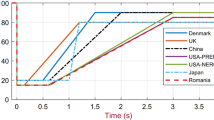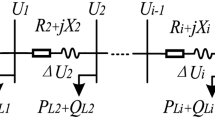Abstract
By using the distributed consensus theory in multi-agent systems, the strategy of economic power dispatch is studied in a smart grid, where many generation units work cooperatively to achieve an optimal solution in a local area. The relationship between the distributed optimization solution and consensus in multi-agent systems is first revealed in this paper, which can serve as a general framework for future studies of this topic. First, without the constraints of capacity limitations, it is found that the total cost for all the generators in a smart grid can achieve the minimal value if the consensus can be reached for the incremental cost of all the generation units and the balance between the supply and demand of powers is kept. Then, by designing a distributed consensus control protocol in multi-agent systems with appropriate initial conditions, incremental cost consensus can be realized and the balance for the powers can also be satisfied. Furthermore, the difficult problem for distributed optimization of the total cost function with bounded capacity limitations is also discussed. A reformulated barrier function is proposed to simplify the analysis, under which the total cost can reach the minimal value if consensus can be achieved for the modified incremental cost with some appropriate initial values. Thus, the distributed optimization problems for the cost function of all generation units with and without bounded capacity limitations can both be solved by using the idea of consensus in multi-agent systems, whose theoretical analysis is still lacking nowadays. Finally, some simulation examples are given to verify the effectiveness of the results in this paper.
Similar content being viewed by others
References
Ahn S J, Nam S R, Choi J H, et al. Power scheduling of distributed generators for economic and stable operation of a microgrid. IEEE Trans Smart Grid, 2013, 4: 398–405
Bakirtzis A, Petridis V, Kazarlis S. Genetic algorithm solution to the economic dispatch problem. Proc Gener Trans Distrib, 1994, 141: 377–382
Attaviriyanupap P, Kita H, Tanaka E, et al. A hybrid EP and SQP for dynamic economic dispatch with nonsmooth fuel cost function. IEEE Trans Power Syst, 2002, 17: 411–416
Gaing Z L. Particle swarm optimization to solving the economic dispatch considering the generator constraints. IEEE Trans Power Syst, 2003, 18: 1187–1195
Park J, Lee K, Shin J, et al. A particle swarm optimization for economic dispatch with nonsmooth cost functions. IEEE Trans Power Syst, 2005, 20: 34–42
Yu X, Cecati C, Dillon T, et al. The new frontier of smart grids: an industrial electronics perspective. IEEE Ind Electron Mag, 2011, 5: 49–63
Yu W W, Wen G H, Yu X H, et al. Bridging the gap between complex networks and smart grids. J Control Decis, 2014, 1: 102–114
Cao Y, Yu W, Ren W, et al. An overview of recent progress in the study of distributed multi-agent coordination. IEEE Trans Ind Inf, 2013, 9: 427–438
Ren W, Beard R W. Distributed Consensus in Multi-vehicle Cooperative Control. Berlin: Springer, 2008
Yu W, Wen G, Chen G, et al. Distributed Cooperative Control of Multi-agent Systems. Newark: Wiley, 2016
Cao M, Morse A S, Anderson B D O. Reaching a consensus in a dynamically changing environment: a graphical approach. SIAM J Control Optimiz, 2008, 47: 575–600
Chen Y, Lü J, Lin Z. Consensus of discrete-time multi-agent systems with transmission nonlinearity. Automatica, 2013, 49: 1768–1775
Saber R O, Murray R M. Consensus problems in networks of agents with switching topology and time-delays. IEEE Trans Auto Control, 2004, 49: 1520–1533
Qin J H, Yu C B, Hirche S. Stationary consensus of asynchronous discrete-time second-order multi-agent systems under switching topology. IEEE Trans Ind Inf, 2012, 8: 986–994
Ren W, Beard R W. Consensus seeking in multiagent systems under dynamically changing interaction topologies. IEEE Trans Auto Control, 2005, 50: 655–661
Yu W, Chen G, Cao M. Consensus in directed networks of agents with nonlinear dynamics. IEEE Trans Auto Control, 2011, 56: 1436–1441
Yu W, Chen G, Cao M, et al. Second-order consensus for multi-agent systems with directed topologies and nonlinear dynamics. IEEE Trans Syst Man Cybern, 2010, 40: 881–891
Yu W, Zhou L, Yu X, et al. Consensus in multi-agent systems with second-order dynamics and sampled data. IEEE Trans Ind Inf, 2013, 9: 2137–2146
Nedić A, Ozdaglar A. Distributed subgradient methods for multiagent optimization. IEEE Trans Auto Control, 2009, 54: 48–61
Yuan D, Ho D W C, Xu S. Regularized primal-dual subgradient method for distributed constrained optimization. IEEE Trans Cybern, 2016, 46: 2109–2118
Liu Q, Wang J. L1-minimization algorithms for sparse signal reconstruction based on a projection neural network. IEEE Trans Neural Netw Learn Syst, 2016, 27: 698–707
Zhang Z, Ying X C, Chow M Y. Decentralizing the economic dispatch problem using a two-level incremental cost consensus algorithm in a smart grid environment. In: Proceedings of North American Power Symposium, Boston, 2011. 1–7
Zhang Z, Chow M Y. Convergence analysis of the incremental cost consensus algorithm under different communication network topologies in a smart grid. IEEE Trans Power Syst, 2012, 27: 1761–1768
Zhang Z, Chow M Y. The Influence of Time Delays on Decentralized Economic Dispatch by Using Incremental Cost Consensus Algorithm. Berlin: Springer, 2012. 313–326
Dominguez-Garcia A D, Cady S T, Hadjicostis C N. Decentralized optimal dispatch of distributed energy resources. In: Proceedings of IEEE 51st Annual Conference on Decision and Control, Maui Hawaii, 2012. 3688–3693
Kar S, Hug G. Distributed robust economic dispatch in power systems: a consensus+innovation approach. Power Energy Soc Gen Meet, 2012
Yang S, Tan S, Xu J. Consensus based approach for economic dispatch problem in a smart grid. IEEE Trans Power Syst, 2013, 28: 4416–4426
Cherukuri A, Cortes J. Distributed generator coordination for initialization and anytime optimization in economic dispatch. IEEE Trans Control Netw Syst, 2015, 2: 226–237
Horn R A, Johnson C R. Matrix Analysis. Cambridge: Cambridge University Press, 1985
Chen G, Wang X, Li X. Introduction to Complex Networks: Models, Structures and Dynamics. Bei**g: High Education Press, 2012
Godsil C, Royle G. Algebraic Graph Theory. Berlin: Springer, 2001
Hale J, Lunel S V. Introduction to Functional Differential Equations. Berlin: Springer, 1993
Barabási A L, Albert R. Emergence of scaling in random networks. Science, 1999, 286: 509–512
Acknowledgements
This work was supported by National Key Research and Development Program of China (Grant No. 2016YFB0800401), National Natural Science Foundation of China (Grant Nos. 61673107, 61673104, 61621003, 61532020), National Ten Thousand Talent Program for Young Top-notch Talents, Cheung Kong Scholars Programme of China for Young Scholars, Six Talent Peaks of Jiangsu Province of China (Grant No. 2014-DZXX-004), and Fundamental Research Funds for the Central Universities of China (Grant No. 2242016K41058).
Author information
Authors and Affiliations
Corresponding author
Additional information
Conflict of interest The authors declare that they have no conflict of interest.
Rights and permissions
About this article
Cite this article
Yu, W., Li, C., Yu, X. et al. Economic power dispatch in smart grids: a framework for distributed optimization and consensus dynamics. Sci. China Inf. Sci. 61, 012204 (2018). https://doi.org/10.1007/s11432-016-9114-y
Received:
Accepted:
Published:
DOI: https://doi.org/10.1007/s11432-016-9114-y




